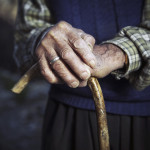Casilda Rivera is 57, HIV positive—and, she now knows, suffering from depression. Diagnosed with HIV in 1992, she struggled to cope with her feelings. But she wasn’t diagnosed with depression until nine years later. That’s not uncommon among older positive people, especially when their doctors miss signs of clinical depression because of cultural gaps. “I had been feeling alone and dislocated,” Rivera says. She stopped going out. “For more than five years I was crying even in my sleep—I knew I needed help.”
As social networks dwindle and ailments multiply, people over 50—especially HIV-positive Latino people like Rivera—are increasingly at risk for depression. For someone already dealing with HIV, depression can throw everything off balance, from work to sleep to med adherence, and damage your overall health. An array of prescription drugs can help bring people out of the doldrums, but combating the disease might be as simple as a friendly telephone call. Researchers at the AIDS Community Research Initiative of America (ACRIA) are exploring whether a weekly phone call may rescue positive people from depressive symptoms.
This theory will be tested in “Telephone Support for Depressed Older People With HIV,” a study building on ACRIA’s 2006 “Research on Older Adults with HIV“ (ROAH). ROAH found that aging HIV-positive adults experience depression at a rate nearly 13 times greater than that of the general population, with the highest rate of depressive symptoms appearing among positive Latinos.
Like HIV, depression that hasn’t been diagnosed can’t be treated, says Marlena Vega, PhD, a clinical psychologist working on the study. “The earlier the diagnosis for depression, the greater the likelihood that you can stabilize it,” Vega says. “Once you perceive depression as a treatable disease rather than something you have brought upon yourself,” she says, “you realize that the golden years don’t have to be the blue years.” A difficulty in treating depression is that, like HIV, it carries its own stigma. The term “depression” is so tainted in Latino communities that researchers have opted to use bajo estado de animo (low mood), bajo energia (low energy) or siente triste (feel sad) instead. “No Latino has depression,” Vega says with irony. “[We think] it brings shame to your family.”
Even when acknowledged, depression tends to occur more frequently in people over 50 because their support resources diminish. “Seventy percent [of positive people over 50] are isolated, with fragile social networks,” says ACRIA researcher Steve Karpiak, PhD. “Family members are often absent.” Older people may stop going out to clubs or socializing in groups where they could find other positive people for support. Evidence has shown the health benefit of social networks. “If that network is curtailed,” Karpiak says, “people don’t do well.” The ACRIA study will investigate the benefits of restoring some social contact.
Researchers will employ a depression screening test, administered over the phone, to determine whether an older positive person should see a health care provider for a mental health referral. Then the researchers will pick up the phone again—every week for the next six months. As clients navigate their way from doctor to psychiatrist to pharmacist, they will receive regular calls simply asking, “How are you, is everything on track?” The technique has already successfully managed non-HIV related depression, hypertension and diabetes.
The method is also reminiscent of the buddy system, a popular tool in ’80s AIDS advocacy before the era of effective HIV treatment—and it is likely to improve physical and mental health. Stress and depression are the primary predictors of non-adherence to HIV meds.
Another basic tool of HIV support is, well, support groups. Between 2001 and 2005, the number of people over 50 living with HIV increased 77 percent; they now represent more than a quarter of all U.S. cases—but resources haven’t kept pace. Slowly, though, AIDS service organizations have been adding “HIV Over 50” groups to their support-service rosters (see sidebar).
To handle her depression, Rivera turned to just such a group, and she feels very much at home there. “I get therapy at [New York City’s] Iris House,” she says. “I’m in a group for positive women over 50 called ‘Divas.’ I go out now, and I feel less isolated. I still cry at times, but I can deal with the sadness because I have support.” If ACRIA’s phone-call therapy produces results, other older positive people might get that support too.
Resources for Fighting Depression If You’re Over 50
Cities that have long had many HIV cases offer services for aging positive folks. For example:
New York: Iris House’s Divas (irishouse.org, 646.548.0100); GMHC’s 50+ Life.Long program (gmhc.org, 212.367.1000); Gay Men of African Descent’s Seniors Program (gmad.org, 212.828.1697); and Brooklyn-based GRIOT Circle’s HIV Over 50 support group (griotcircle.org, 718.246.2775).
San Francisco: New Leaf Services offers programs including home visits (newleafservices.org; 415.626.7000).
Washington, DC: Whitman-Walker Clinic hosts an over-50 support group (wwc.org; 202.939.7690).
Chicago: Howard Brown Health Center has LGBT elder services (howardbrown.org; call Rebecca Finer, 773.388.8901).
Los Angeles: AIDS Project Los Angeles provides over-50 support groups (apla.org; 213.201.1621).
In places with fewer HIV cases and services, consider joining a conference call support group. Enroll in a phone group for positive people over 50 at Project LinkAge, 877.665.0288.
Look for a doctor or therapist familiar with your cultural background. You may feel more comfortable asking questions. (Find one in “Survival Tools” at poz.com.)
Check your local AIDS service organizations (ASOs) and senior citizen organizations for support groups and activity partners.
Mix socially at church groups, bowling leagues or organized card and board-game tournaments.
While some older people don’t use computers as regularly as younger folks, if you are web savvy (or know someone who is), seek help at mentor.poz.com (one-on-one confidential support) or forums.poz.com (a global 24/7 live chat room for positive people). Or find peers through Craigslist.
Call HIV Over Fifty, the longest-running organization for those aging with HIV, any time at 617.233.7107. It will provide support and connect you with resources (including support groups and phone buddies) in your area.
Find aid for LGBT positive people over 50 at sageusa.org; 212.741.2247. Ask about its annual conference, taking place from October 12 to 14 in Brooklyn, New York.
To apply for ACRIA’s study, to find English and Spanish training DVDs on mental health concerns or to reach ACRIA’s new Center for HIV and Aging, visit acria.org; 212.924.3934.
Greying the Blues
HIV plus aging can add up to high rates of depression. Help may be a support group—or a phone call—away.






1 Comment
1 Comment